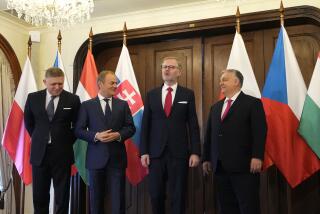Eastern Europe Gets Environment Center : Pollution: The West warns that it can pay little of the cost of cleaning up the industrial waste and poisons left by 40 years of Communist rule.
- Share via
BUDAPEST, Hungary — The United States and Western Europe pitched in to launch an Eastern European environmental center Thursday but put the struggling new democracies on notice that they will have to foot the massive cleanup bill largely by themselves.
The center’s $12-million start-up fund is only a droplet of cure for an ocean of environmental illness gripping the Continent, raining poison on forests and shrouding cities in clouds of industrial smoke. Environmental damage during 40 years of Communist rule is estimated in the hundreds of billions of dollars.
Eastern Europe’s pollution is so severe that pedestrians get lightheaded for lack of oxygen in downtown Budapest on windless days, and residents of the industrial areas of southwestern Poland live 10 years less on average than their European neighbors. Contaminated drinking water and lead emissions contribute to soaring infant mortality and lung disease in the region, and rain in parts of Poland, East Germany and Czechoslovakia has the same acid level as vinegar.
Although the environmental catastrophe bequeathed by communism has been exposed by the region’s new democratic governments, little has been done to check its spread.
The message at Thursday’s opening of the Regional Environmental Center was that recovery will be a long time in coming and that Eastern Europeans cannot count on Western largess to solve their environmental problems.
“We have our own budget crisis,” U.S. Environmental Protection Agency Administrator William K. Reilly told reporters. “We will make technology available and assist where we can, but we are not in a position to commit funds to these projects.”
The Bush Administration contributed $5 million to the center, but, faced with the multibillion-dollar cost of cleaning up U.S. toxic waste dumps and nuclear burial sites, Washington cannot realistically promise major financing abroad, Reilly said.
The independent, nonprofit center in Budapest will operate more as a think tank and data base than as an environmental advocacy group, Executive Director Peter Hardi explained. He described his center’s meager budget as “a symbolic, preliminary gesture to be followed in the future with much stronger support.”
Acid rain and toxic rivers flowing from East to West may elicit more funding from the European Community, as environmental investments in Hungary, East Germany and Czechoslovakia could prove the most effective means of reducing pollutants now wending their way into neighboring Western countries.
But a sobering realism has pervaded Eastern Europe in the wake of the Persian Gulf crisis, which threatens the global economic outlook and has relegated the region’s economic recovery to a political back burner.
As the result of Soviet oil cutbacks and unpaid bills run up by Iraq, nations such as Hungary and Bulgaria are expecting a sharp decline this year in their economic performance and in the income needed to bankroll a cleanup.
Even if the West had the money to spare, handing over cash to crisis-ridden nations would be unwise, Reilly said. And some Eastern European environmentalists agree.
“It might seem wonderful if we were to get so much money, but we are not ready to manage this support,” Andrzej Kassenberg of the Polish Ecological Club conceded.
Although research-oriented facilities such as the Budapest center run the risk of expanding the bureaucracy while pollution continues to corrode the environment, the countries of Eastern Europe now lack the expertise needed to force industry to clean up after itself.
The West could be most influential in the ecological recovery by trading off the debt it holds for specific environmental cleanup projects, suggested Kassenberg, an environmental policy expert at Warsaw’s Academy of Sciences.
Poland owes nearly $40 billion to Western creditors; Hungary’s debt is about $20 billion, and Bulgaria, which suspended debt payments in March, is $11 billion in the red.
Reilly and other Western officials emphasized to the hundreds of government and civic leaders at the new facility in a 200-year-old silk mill that, despite the scarcity of funds, Eastern Europe can start immediately on preventing new industries, especially those opened by Western investors, from repeating the mistakes of their Communist predecessors.
“What is needed is a code of good conduct for investors, so that Western countries will be obliged to impose the same standards in Eastern projects as they do in Western ones, so that Eastern Europe won’t be environmentally colonized,” said Laurens-Jan Brinkhorst, a Dutchman who heads the European Community’s Environment Directorate.
More to Read
Sign up for Essential California
The most important California stories and recommendations in your inbox every morning.
You may occasionally receive promotional content from the Los Angeles Times.











